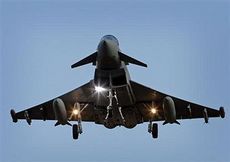 Over at his new blog for the Wall Street Journal, Iain Martin ups the provocative factor by asking: “Will the Tories axe the RAF?” Here’s the key passage:
Over at his new blog for the Wall Street Journal, Iain Martin ups the provocative factor by asking: “Will the Tories axe the RAF?” Here’s the key passage:
“It has long been the dirty little secret of the U.K. defence establishment that a way to streamline the command structure, reduce duplication and slash costs is to close the RAF. There are two options for how it could be done:
1) Abolish the traditional three services and switch to a single marine corps model, with all three services effectively merging under new leadership. Or,
2) Split the RAF’s capacity between the two remaining services, giving the army the lift and delivery components and the navy responsibility for the strike capability, meaning fighters etc.
A thoughtful Brigadier of my acquaintance, who favours option 1, says that inside the MoD there is a growing acceptance that the existing three service model is too expensive and unsustainable. Not a soul will say this in public, yet.”
And he rounds off the entire post with this:
“It’s enough to give those in the Tory leadership nightmares, and probably persuade them not to be so radical. But if they don’t cut something of that order it is difficult to see how the circle can be squared on British defence spending. If it is not to be the RAF, then what goes instead?”
Now, my father served in the RAF, so I’m probably fonder of our air force than most. But, putting that aside, there are still serious questions to be asked about the idea of scrapping the RAF, particularly if that idea is to be counted as an Age of Austerity measure. For starters, just how much money would this save? Presumably, existing RAF resources would be spread between the Army and Navy (or subsumed by a “single marine corps”), but there’d also have to be money spent on extra manpower, training and equipment for those revamped services. So while we might see significant savings in the medium term, the initial outlay could be immense – and, crucially, it could sap funds away from other areas of defence budget.
But even if the upfront costs weren’t too great, could the military manage a historic reorganisation at a time when it’s spread thinly, in and out of conflict, across the globe? This kind of change would probably take years to fully implement. And I imagine many in Whitehall wouldn’t be confident about overseeing it if the Iran situation, or any one of a hundred other threats, started to heat up.
This isn’t to say that a streamlined military isn’t desirable. The questions I ask above are just that: questions, for which I like to see some solid answers. But Iain’s more general point is indisputable: the Tories should be probing into pretty much every single area of public spending. Brown’s debt crisis will require radical, unprecedented solutions, even if scrapping the RAF isn’t one of them.






Comments